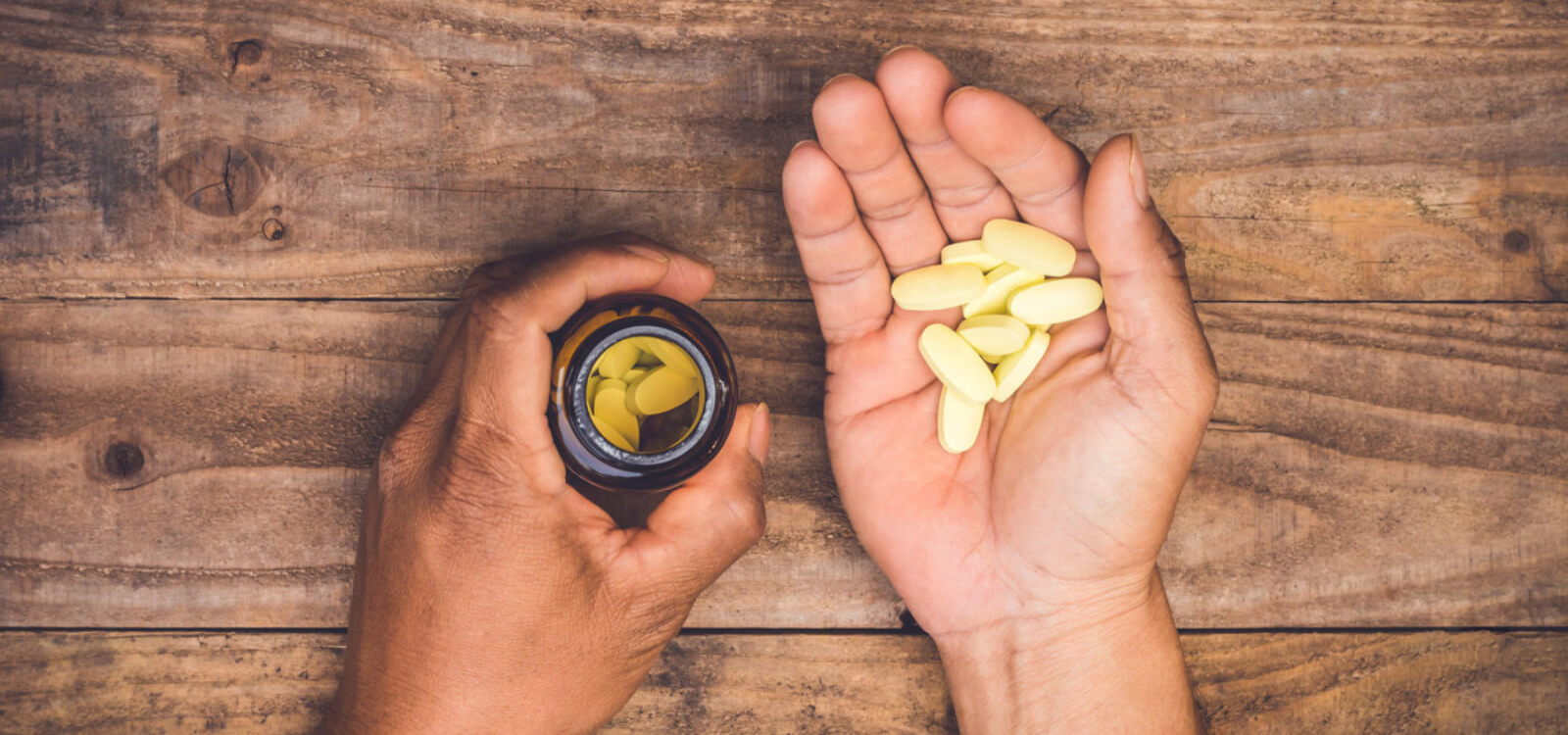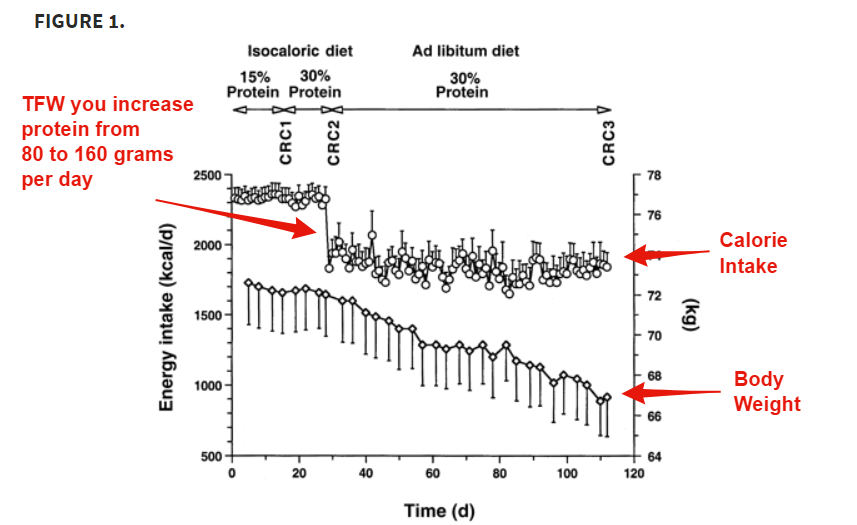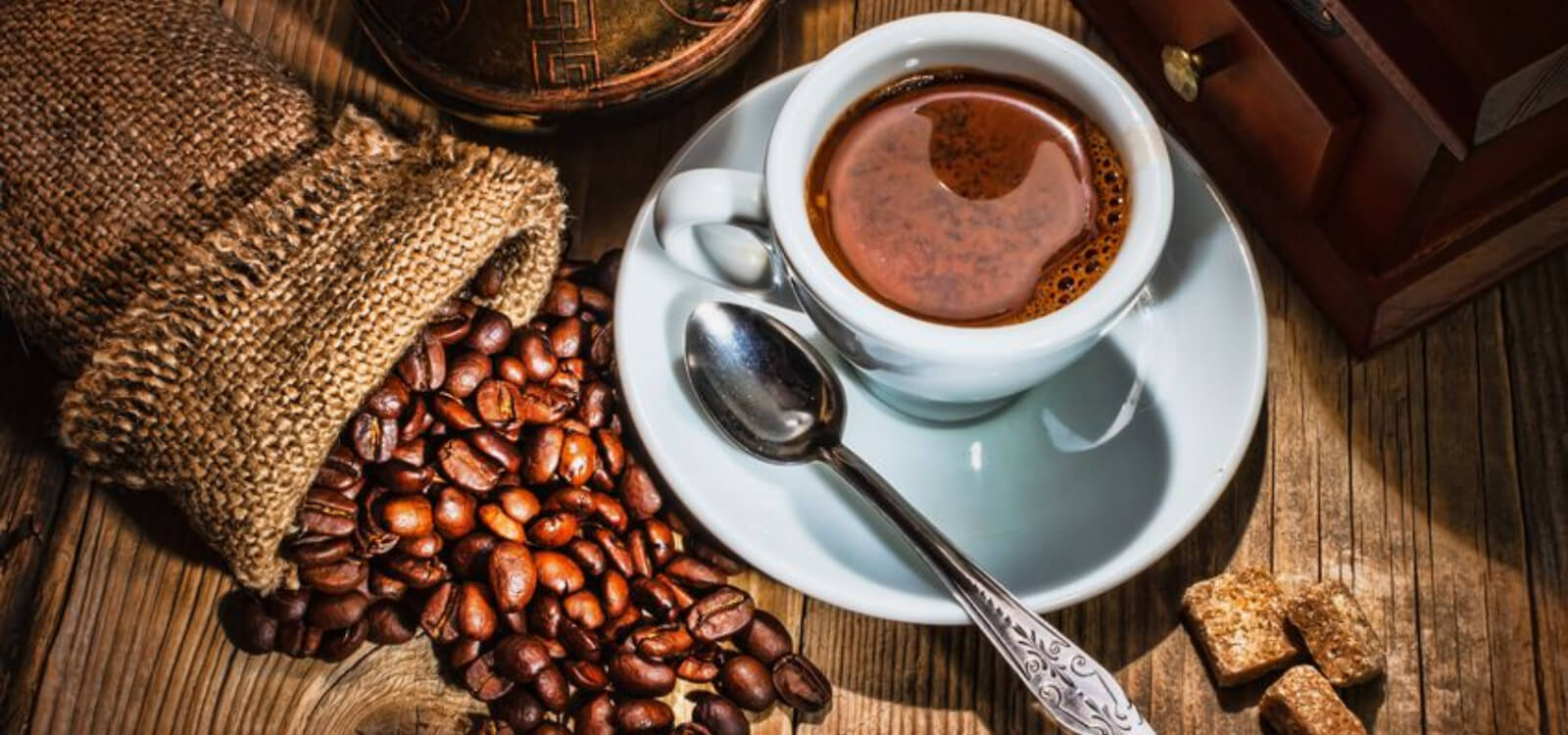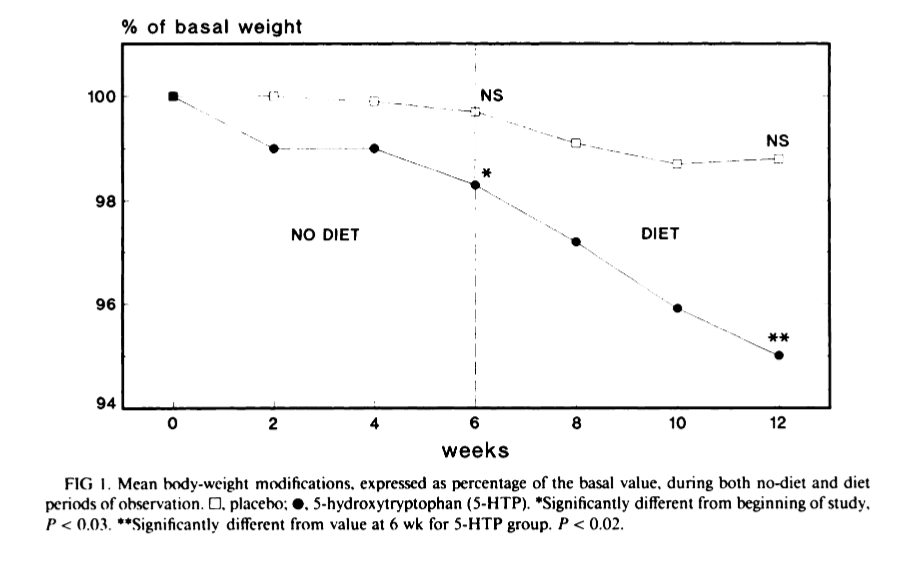Key Takeaways
- A natural appetite suppressant is a substance that reduces your desire to eat without using synthetic compounds that might have negative long-term effects.
- Although it’s best to get as much mileage out of diet and training as possible when it comes to weight loss, there are safe, natural appetite suppressants that can help.
- The five best natural appetite suppressants according to science are protein powder, caffeine and coffee, 5-HTP, synephrine, and yohimbine.
The number one reason people struggle to lose weight is they don’t stick to their diet.
Why?
Well, that’s the million dollar question.
Some people get bored with their food choices, lack of progress, and daily routine, and revert to their old eating habits.
Some people get thrown off course by a holiday, vacation, or unplanned restaurant outing and never pull themselves back on track.
Others try to lose weight too fast and end up running into a quicksand of low-energy, irritability, hunger, and obsessive thoughts about food that causes them to binge and gain back much of the weight they lost.
While those first two obstacles are relatively easy to solve, it’s that last one that’s often the bane of even the most experienced dieters.
Losing weight requires that you maintain a calorie deficit for weeks or months on end.
That is, you need to be eating fewer calories than you burn for quite some time to see a noticeable change in your appearance.
Most people have no trouble maintaining a calorie deficit for a few days or weeks, but it’s sticking it out day after day after day that wears people down and breaks their resolve.
And one of the key gremlins that plagues their progress is hunger.
There’s a lot you can do to counter hunger—eating more protein and fibrous fruits and vegetables, eating fewer processed foods, and (ironically) exercising, but if you diet for long enough it will become noticeable, especially between meals.
One of the things you can do to avoid being harried by hunger is taking natural appetite suppressants.
Now, appetite suppressants generally have a bad rap, and understandably so. Many harsh weight loss drugs like clenbuterol work partially because they also reduce appetite, and the most effective appetite suppressants often come with strong and potentially permanent side effects.
For example, while “clen” is an outstanding appetite suppressant, it also increases the risk of heart failure, potassium deficiency, and insomnia.
That said, it would be unfair to paint all appetite suppressants with the same brush as clenbuterol.
There are healthy, effective, natural appetite suppressants that can help you curb hunger and cravings without compromising your health.
While I’m an advocate of getting as much mileage out of your diet and training as possible before resorting to supplements, there are several kinds of natural appetite suppressants worth trying if you’re struggling to keep the hunger hobgoblins at bay.
And by the end of this article, you’ll know everything you need to know about which natural appetite suppressants are worth trying and which aren’t.
Specifically, you’ll learn . . .
- What appetite suppressants are
- How appetite suppressants work
- The five best natural appetite suppressants for losing weight
- And more.
Let’s get started.
Want to listen to more stuff like this? Check out my podcast!
What Is Appetite?

To understand what an appetite suppressant is, you first have to understand what appetite is.
The Oxford English Dictionary defines appetite as “a natural desire to satisfy a bodily need, especially for food” and “a strong desire or liking for something.”
Appetite differs slightly from hunger, in that it’s primarily a psychological impulse rather than a physiological imperative.
Hunger could be described as the physical sensation of lacking and needing food, whereas appetite could be described as the emotional sensation of wanting food.
For example, if you stay in a calorie deficit for three months, toward the end of that period you’ll probably feel hungry between meals.
This is due to a series of physiological shifts that take place inside your body in response to a calorie deficit—primarily a reduction in leptin—that forces you to experience hunger.
On the other hand, you could be eating plenty of calories and have normal leptin levels—with no physical urge to eat more calories—and still have your appetite spurred on by the scent of a freshly baked Cinnabon.
Here’s another way to put it:
Hunger is what nudges you to get off the couch and walk to the fridge. Appetite is what urges you to pick cheesecake over carrots.
After you reach a certain level of leanness, usually about 8% body fat for men and 18% body fat for women, there’s not a lot you can do to counter the effects of hunger.
While this is sad news if you’re determined to stay #shredded365, it makes perfect sense from an evolutionary perspective.
Hunger is foremost a self-preservation mechanism, and it’s forced us to forage and fight for food for the last 100 million years. You can’t undo many lifetimes of genetic programming through sheer willpower alone.
In fact, some scientists have hypothesized that anorexia nervosa is an evolutionary remnant of early man’s need to go long periods of time without food, and the genes that allow people to voluntarily starve themselves are also the ones that allowed their ancestors to endure periods of famine.
Thus, eliminating hunger is a fool’s errand.
Appetite is a bit different, though.
While it’s healthy and normal to experience an increase in appetite at certain points throughout the day, our modern environment is tailor-made to keep our appetite elevated 24/7.
For example, Cinnabon strategically locates the ovens in their stores as close to the customers as possible and tries to place stores in malls and airports, where the smell of their delicious confections can linger among large groups of people.
It’s estimated that Americans are exposed to anywhere from 1,000 to 4,000 ads per day, many of them for high-calorie, highly-processed foods that don’t keep us full.
Food companies spend billions of dollars designing their food to be as delicious, palatable, and unfilling as possible, making it easy to eat thousands of calories of junk food and remain eager for more.
Portion sizes of packaged and restaurant foods have also increased exponentially over the past four decades, largely contributing to the rise in obesity.
These factors are keeping our collective appetite for food stimulated far beyond the level we need to satisfy our hunger and basic nutritional needs, and they’re largely to blame for why we’ve become one of the fattest nations on Earth.
Keep all of this in mind when people ask “Why can’t I just rely on intuitive eating to reach a healthy weight?”
That’s like someone saying they want to navigate a minefield by feel. Sure, it can work, but your risk of failure is probably higher than simply taking a different route. (And when it comes to dieting, that route is meal planning).
There’s a lot you can do to weather the tempest of tempting goodies you’re bombarded with, though.
- For example, planning and preparing high-protein, high-fiber meals for the day ahead reduces your chances of succumbing to the siren’s call of high-calorie junk food.
- Limiting your exposure to food and food advertising by refusing to leave snacks around the house, going to normal restaurants instead of buffets, and watching less T.V. (which is filled with ads for fast-food) all go a long way in strengthening your resolve.
- Staying active, getting enough sleep, and engaging in other healthy behaviors also tends to have a compounding effect, making sticking to your diet easier as well.
And then, of course, you can also use natural appetite suppressants to take the sting out of dieting even further.
What Is a Natural Appetite Suppressant?
An appetite suppressant is any substance that reduces your desire to eat.
A natural appetite suppressant is a substance that reduces your desire to eat without using synthetic compounds that might have negative long-term effects.
Technically, anything that reduces appetite could be considered an appetite suppressant, including exercise, adequate sleep, or even gastric bypass surgery.
When people say “natural appetite suppressant,” though, they’re typically referring to supplements, herbs, and other compounds will reduce their urge to eat, which is what we’ll focus on.
Check out this article if you want to learn about several non-supplemental methods for reducing appetite:
8 Ways to Improve Hunger Control and Weight Loss
The 5 Best Natural Appetite Suppressants

The five best natural appetite suppressants are . . .
- Protein powder
- Caffeine and coffee
- 5-HTP
- Synephrine
- Yohimbine
Let’s start at the top.
The Best Natural Appetite Suppressant #1
Protein Powder
Protein is the most satiating macronutrient per calorie that you can eat.
For every gram of protein you consume, you’re going to decrease your appetite significantly more than you would by eating a gram of carbohydrate or fat.
A good example of this comes from a study conducted by scientists at the University of Washington.
The scientists had 19 middle-aged slightly overweight but otherwise healthy men and women follow three different diets sequentially:
- The first diet included enough calories to maintain their weight, with 35% of calories from fat, 50% from carbohydrate, and 15% from protein, which they followed for two weeks.
- The second diet included enough calories to maintain their weight, with 20% of calories from fat, 50% from carbohydrate, and 30% from protein, which they followed for two weeks.
- The third diet included identical calories and macronutrient ratios as the second, but with a twist. Instead of eating everything they were given, the participants were told to only eat until they were satisfied, then stop and record how much they ate, which they did for 12 weeks.
Before and during the study, everyone kept a food log and met with a dietitian two to three times per week to ensure compliance and have their weights measured. Every meal the subjects ate was prepared ahead of time by the scientists to minimize the chances of people eating more or less than they should.
Throughout the study, all of the participants kept subjective diaries of how hungry they felt every day.
During the first two weeks of the study, none of the subjects lost a significant amount of weight, which is what the researchers intended (the subjects were provided enough calories to maintain their weight).
After switching from the first (low-protein) diet to the second (high-protein) diet for two weeks, the subjects experienced a sharp decrease in hunger, but didn’t lose weight since they still had to finish all of their meals.
Things got interesting as the subjects entered the last phase of the study, though.
When they were allowed to eat as much or as little as they wanted, they voluntarily ate 500 fewer calories per day. This caused a rapid and consistent drop in body weight that continued for the remaining 11 weeks of the study.
By the end of this period, the subjects had lost 11 pounds and 3% body fat, while feeling less hungry than at the start of the study.
This was all thanks to increasing their protein intake from about 80 grams per day to around 160 grams per day, which is still a relatively small amount of “bodybuilding” standards.
Here’s how the scientists presented their data (with a few notes from moi).

As you can see, after the subjects were allowed to start relying on their appetite instead of being forced to finish all of their meals, their food intake plummets and they start losing weight rapidly.
That’s the power of eating a high-protein diet.
In this study, the subjects bumped up their protein intake by eating whole foods such as egg whites, fat-free milk, and white turkey meat, which are all excellent choices.
The main difference between their situation, and yours, though, is you probably don’t have a team of scientists preparing all of your meals for you ahead of time.
Even if you do make time to plan and prepare your meals ahead of time, it’s nice to try something different from your standard protein-rich staples.
That’s where protein powder comes in handy.
High-quality protein powder is almost entirely protein by weight, meaning you get to eat more fat and carbs from whole foods while still hitting your protein targets.
Protein shakes are also the perfect solution for when you need to hit your protein target for the day but don’t feel like preparing another chicken breast or plate of egg whites.
Plus, high-quality protein powder tastes great (well, it should), making for a tasty, macro-friendly treat.
As far as what protein powder you choose, animal-based protein powders such as whey, casein, and egg white protein are generally going to have more protein by weight than plant-based proteins like hemp, quinoa, and pea protein.
Now, you may have heard that protein powder doesn’t have the same satiating effect as whole food proteins, but research shows otherwise.
Evidence of this fact comes from a study conducted by scientists at Skidmore College, which found that people who replaced half of their daily protein intake with protein powder lost just as much weight as people who got all of their protein from whole foods.
Both groups were allowed to eat as much as they wanted throughout the study, so if protein powder was less satiating, you would have expected the group sucking down protein shakes to eat more and lose less weight. That’s not what happened, though.
You don’t need to eat protein powder to get the appetite-suppressing effects of protein, but it’s certainly a convenient way to get the job done.
Check out these articles to learn more about the best protein powders for you:
How to Find the Best Protein Powder For You
The Ultimate Guide to the Best Protein Powders: Whey, Casein, Egg, Soy, and More . . .
How to Find the Best Protein Powder for Women
What is the Best Protein Powder for Building Muscle?
And if you’re interested in a high-quality casein or whey protein powder, might I suggest you try one of ours? (Personally, I love the casein protein).
And if animal-based protein powder isn’t your jam, you may want to check out our plant-based vegan protein powder, Plant+.
The Best Natural Appetite Suppressant #2
Caffeine and Coffee

Caffeine is a stimulant, which means it increases levels of neurotransmitters known as catecholamines in the body.
The main catecholamines involved in weight loss are epinephrine and norepinephrine, as they increase metabolic rate, arousal, and willingness to exercise, and they reduce hunger.
Unlike many other unsafe stimulants, caffeine is remarkably well-tolerated by the body even at high doses.
That said, the same mechanism in the body that reduces appetite in response to stimulants also increases nausea, which is why some people feel sick after consuming too much caffeine. This isn’t typically an issue with more moderate doses, though.
Another downside to caffeine is that after a few weeks of steady use, your body becomes desensitized to the appetite-suppressing and energizing effects.
You can prolong the effectiveness of caffeine, though, by including several low- and no-caffeine days per week.
A good rule of thumb is to take caffeine for no more than two weeks before taking a week or two off to resensitize the body to its effects, or sticking to this dosing schedule to maintain your caffeine sensitivity:
- 3 to 6 mg per kg of caffeine per day 3 days per week.
- 1 to 3 mg per kg of caffeine 3 days per week.
- 0 mg of caffeine 1 day per week.
I’m not aware of any research approximating this particular schedule, but based on my experience it allows you to maintain some of the appetite-suppressing effects of caffeine for months rather than weeks.
Caffeine sensitivity is also highly individual, so you may be able to benefit from smaller or larger amounts of caffeine for shorter or longer periods, depending on your genetic makeup.
If you aren’t a regular caffeine user, start on the low end of the spectrum with 3 mg per kg of body weight per day and see how you feel. If you notice a significant decrease in appetite and an increase in energy, stick with that dose until it stops working. If you don’t notice any change, up the dose to 4 to 6 mg per kg of body weight per day.
Now, obviously coffee is the most common way people consume caffeine, and for a long time people thought the appetite-suppressing properties of coffee were solely due to caffeine.
New science shows that may not be the case, though.
At least one study conducted by scientists a Brooklyn College has found that decaffeinated coffee produced even more of a reduction in appetite than caffeinated coffee, though.
Although this study hasn’t been replicated and it’s well-established that caffeine does reduce appetite, it’s possible coffee might have some other compounds that could potentially help reduce food intake in addition to caffeine.
And what if you aren’t a coffee drinker?
Well, if you want a tasty, efficient way to get your daily dose of caffeine, along with five other ingredients proven to improve workout performance and alertness, you may want to try Legion’s pre-workout supplement Pulse. (Pink Lemonade is my current favorite).
The Best Natural Appetite Suppressant #3
5-HTP
5-HTP is a compound involved in the metabolism of the amino acid tryptophan, which is found in foods like milk, meat, potatoes, pumpkin, and various greens.
Tryptophan is converted into serotonin in the brain, which is one of the principal neurotransmitters involved in feelings of happiness. Serotonin also plays a role in controlling appetite, with higher levels in the brain generally leading to a reduction in food intake.
Research shows that, when taken with food, 5-HTP increases feelings of fullness and thus helps you control your food intake.
A good example of this is a study conducted by scientists at the University of Rome.
The scientists divided 20 obese men and women into two groups:
- Group one consumed 900 mg of 5-HTP per day.
- Group two consumed a placebo.
For the first six weeks of the study the participants were allowed to eat as much as they wanted to see how 5-HTP affected real world eating behaviors. For the last six weeks of the study, the participants were coached to eat 1,200 calories per day while continuing their supplement regimen.
By the end of the study, group one lost about 5% of their body weight, whereas group two lost none.
You can see the effects of 5-HTP clearly in this diagram:

The line with empty white squares is the weight of the group that took a placebo (group two). The line with the black circles is the weight of the group that took 5-HTP (group one).
Not only did group one find it easier to stick to their 1,200 calorie per day diet in the last six weeks of the study, they also spontaneously ate less during the initial unrestricted eating period.
Group one also experienced a significantly greater reduction in appetite versus group two throughout the study, which was likely responsible for their greater weight loss. What’s more, they also experienced a 50% reduction in their intake of carbs, indicating that 5-HTP may particularly reduce carb cravings.
One question you may be wondering, though, is if 5-HTP is converted into tryptophan in the brain, why not just supplement with tryptophan?
Well, unlike L-tryptophan (the most common supplemental form), 5-HTP can cross the blood-brain barrier, and is used preferentially over serotonin due to a greater safety profile with oral administration.
Clinically effective dosages of 5-HTP range from 150 to 500 mg.
If you’re interested in trying 5-HTP as a natural appetite suppressant, you can find 150 mg in Legion’s fat burner supplement, Phoenix. (The dose was intentionally kept on the low side, as hordenine, another ingredient in Phoenix, amplifies the effects of 5-HTP.)
The Best Natural Appetite Suppressant #4
Synephrine
Synephrine is a chemical compound found in certain types of citrus fruits (particularly the bitter variety).
It’s chemically similar to ephedrine, adrenaline, and noradrenaline, which promote the breakdown of fat cells, and although less potent than those three compounds it induces similar effects.
Synephrine is a mild stimulant, and as you learned a moment ago, any stimulant can help suppress hunger between meals.
Like caffeine, synephrine accomplishes this by increasing catecholamine levels in the blood, sending a signal to your brain to reduce appetite.
Synephrine also offers a few other effects that are beneficial for weight loss. It . . .
- Increases both basal metabolic rate and lipolysis.
- Inhibits the activity of certain types of fat cell receptors that prevent fat mobilization.
- Increases the thermic effect of food, which is the “energy cost” of metabolizing food.
Furthermore, research shows that synephrine works synergistically with caffeine to enhance both caffeine’s and its own fat loss properties. The synergism noted in a standard “ECA” (ephedrine, caffeine, and aspirin) stack also applies to synephrine.
Clinically effective dosages of synephrine range from 25 to 50 mg, and Phoenix contains 50 mg of synephrine per serving.
The Best Natural Appetite Suppressant #5
Yohimbine

Yohimbine is a chemical extracted from a species of African plant, Yohimbe.
While it’s best known for boosting the breakdown of stubborn fat cells when combined with fasted training, it’s also an effective appetite suppressant.
Like caffeine and synephrine, yohimbine does this by increasing catecholamine levels, which reduces appetite.
Research also shows that yohimbine can improve exercise performance and it’s particularly effective at fighting off the physical fatigue associated with dieting and increasing time to exhaustion.
There’s very little published data on the optimal dose of yohimbine for suppressing appetite, but it’s likely about the same as it is for increasing fat loss and improving workout performance: 0.1 to 0.2 milligrams per kilogram of body weight.
Legion’s pre-workout fasted fat-burner, Forge, contains 10 mg of yohimbine per serving.
We chose this dosage per serving, and chose to include 2.5 mg of yohimbine per capsule of Forge, because it allows for flexibility in dosing to meet the needs of various body weights.
This dosing also allows for maximal safety. While yohimbine is generally well tolerated in lower doses, overdosing can cause various negative side effects like agitation, anxiety, hypertension, and tachycardia (elevated heart rate). This is why people with anxiety and panic disorders are not advised to take yohimbine.
So for example, a clinically effective dosage of yohimbine for a 150-pound woman would be 7 to 13 mg, and 1 serving of Forge (4 caps) fits nicely in the middle. If it’s well tolerated, she could add 1 additional capsule to her pre-workout dosage and reach the top of the clinically effective range.
A clinically effective dosage for a 200-pound man, however, is a bit higher: 9 to 18 mg. In this case, he could start with 1 serving per day to assess tolerance and move up to 6 to 7 capsules before training for the full clinically effective dosage for his body weight.
Take yohimbine 30 to 60 minutes before training if you also want to take advantage of its fat-burning properties.
If you want to learn more about the benefits of yohimbine for fat loss, you want to learn more about Forge.
The Bottom Line on the Best Natural Appetite Suppressants
A natural appetite suppressant is a substance that reduces your desire to eat without using synthetic compounds that might have negative long-term effects.
While diet, exercise, and other lifestyle behaviors like sleep are going to move the needle the most in terms of controlling hunger and driving fat loss, there are safe, effective, natural appetite suppressants that can help.
The five best natural appetite suppressants are . . .
- Protein powder
- Caffeine and coffee
- 5-HTP
- Synephrine
- Yohimbine
Here’s how to get the most out of each of these supplements:
- Make sure you get at least 1 to 1.2 grams of protein per pound of bodyweight while cutting, and use protein powder as preferred or needed to hit that target.
- Take 3 to 6 mg of caffeine per kilogram of bodyweight per day for two weeks at a time before taking a 1 to 2 week break. Or, take that dosage of caffeine 3 days per week, 1 to 3 mg per kg 3 days per week, and have 0 mg of caffeine 1 day per week. Use coffee, Pulse, or your caffeine source of choice to hit these targets.
- Take 150 to 500 mg of 5-HTP per day. Use Phoenix or another safe, effective, natural source of 5-HTP, to hit this target.
- Take 25 to 50 mg of synephrine per day. Use Phoenix or another safe, effective, natural source of synephrine to hit this target.
- Take 0.1 to 0.2 mg of yohimbine per kg of body weight per day 30 to 60 minutes before fasted training, or first thing in the morning if you aren’t training fasted. Use Forge or another safe, effective, natural source of yohimbine to hit this target.
Remember, to get the most out of these supplements it’s also imperative that you how to maintain a calorie deficit by managing your diet properly. Check out this article to learn how to do that:
The Definitive Guide to Effective Meal Planning










